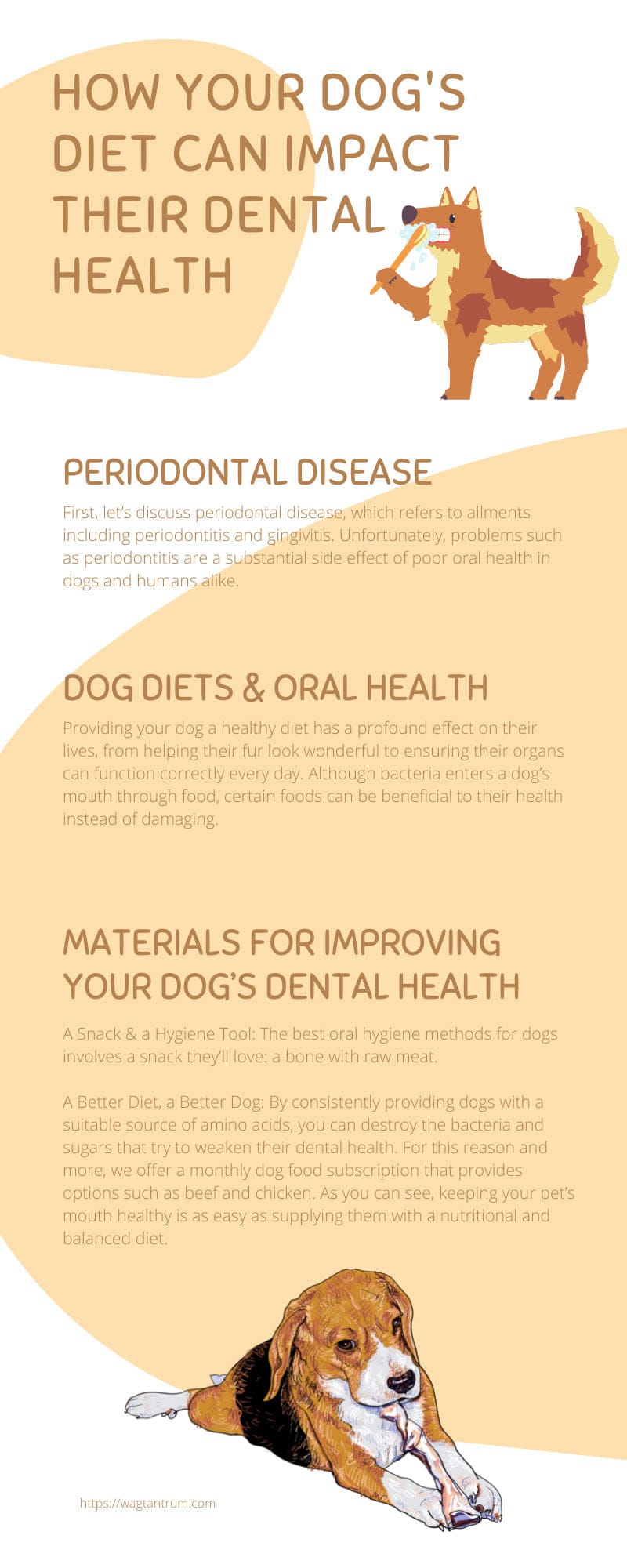Your dog’s dental health is a critical component of their overall well-being, impacting not just their mouth but their entire body. This article explores how your dog’s diet can contribute to their dental health and highlights specific foods that are beneficial for their teeth.
Understanding Dog Dental Health
The oral health of your dog is intrinsically linked to their general health. Many dogs suffer from common and often painful dental issues like periodontal disease, tooth decay, and tooth loss. These conditions can have serious repercussions for your dog’s long-term health and quality of life. Regular dental hygiene, professional veterinary cleanings, and a well-balanced diet are all essential for maintaining a healthy mouth.
Top Foods for Canine Dental Health
While consistent oral care routines are paramount, certain foods and food-related items can actively help scrub away plaque and maintain healthy teeth. Here are five excellent options to consider for your dog’s dental hygiene:
1. Raw Animal Bones
Raw bones are highly effective at removing bacteria and debris from around your dog’s teeth due to their natural flexibility and texture. It’s crucial to select bones that are appropriately sized for your dog to prevent choking hazards. Never give your dog cooked bones, as they can splinter and cause severe internal injuries.
2. Fruits and Vegetables
Many dogs enjoy sharing fruits and vegetables as treats. Carrots, apples, and pumpkin are excellent choices as they are easy to consume and less likely to stick to the teeth. Beyond their teeth-cleaning properties, these foods are rich in antioxidants, which help combat chronic oxidative stress that can contribute to periodontitis. Remember that treats, including fruits and vegetables, should constitute no more than 10% of your dog’s daily caloric intake.
3. Specially Designed Dental Chews
Molded dental chews are specifically formulated to help clear plaque and food debris from your dog’s teeth. Many of these treats also offer the added benefit of freshening your dog’s breath. Beyond their oral health advantages, dental chews provide an appropriate outlet for dogs to alleviate boredom and anxiety, redirecting chewing behavior away from your furniture and belongings. They can also be incorporated into training as a positive reinforcement tool.
4. Yogurt or Kefir
The probiotics found in yogurt and kefir are vital for maintaining a healthy gut microbiome and supporting your dog’s immune system. These can be given to your dog orally or by adding plain, unsweetened yogurt to their regular diet. The probiotics help eliminate harmful bacteria in the mouth, which can prevent inflammation and the development of periodontitis.
5. Dental Care-Specific Dry Dog Food
When selecting dry dog food, always examine the ingredients to ensure they are natural and beneficial. Look for foods that contain real meat, essential fatty acids, and vitamins that contribute to healthy teeth. Numerous pet food manufacturers offer specialized dry foods designed to support dental health through their nutritional content and the unique size and texture of the kibble.
How Age Influences Your Dog’s Diet and Dental Needs
As dogs age, their metabolism naturally slows down, and their energy levels often decrease, leading to a less active lifestyle. If a senior dog continues to consume the same amount of calories without a corresponding reduction in exercise, they are at a higher risk of becoming overweight. This shift in metabolism and activity level necessitates a review of their diet to ensure it still meets their nutritional needs without contributing to unhealthy weight gain. Dental health can also be impacted by age, with older dogs sometimes experiencing increased sensitivity or different chewing abilities.
Exploring Different Types of Dental Diets for Dogs
The market offers various specialized dental diets for dogs, each designed with specific oral health benefits in mind. These diets must still provide all the essential nutrients found in regular dog food to ensure overall health. In addition to basic nutrition, these specialized foods often include added nutrients crucial for maintaining healthy teeth and gums. Many dental diets feature larger kibble sizes with a distinct, often fibrous, texture. This design is intended to encourage chewing and allow the kibble to mechanically scrape away plaque and debris from the tooth surfaces as your dog eats.
Consulting Your Veterinarian
For personalized advice on your dog’s dental health and dietary needs, it is always best to consult with your veterinarian. They can provide specific recommendations based on your dog’s age, breed, and overall health condition. If you are considering switching your dog to a specialized dental diet or have questions about managing their oral hygiene, your vet is the best resource.
Note: The information provided in this article is for general knowledge and informational purposes only, and does not constitute medical advice. For any specific concerns about your pet’s health, please consult with a qualified veterinarian.
Are you contemplating a transition to a dental diet for your canine companion? Contact our veterinary team for a professional consultation. We are ready to address all your questions and guide you in making the best choices for your dog’s health.

